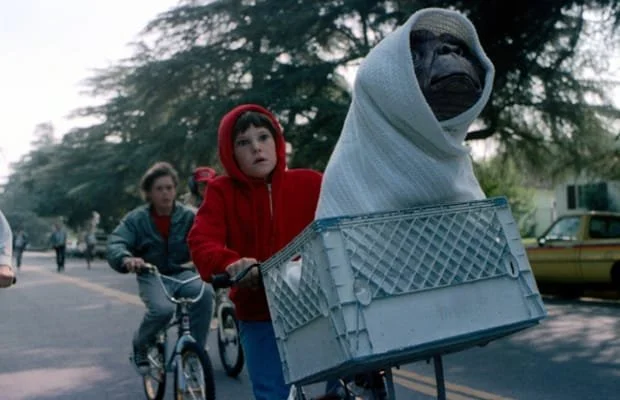Alright, I know it’s been forever and a fortnight since I’ve done one of these, but you know, there’s still no sign of a new AFI list coming out so I’ve got time.
Lots of these movies are famous, but most are not as famous as this one (sorry Shane). It makes sense: it’s made by likely the most famous director in the world (someone who is just a part of our adult lives as he is our childhood lives). It has a character we all know by name and nickname. And it led to the best theme park ride of any movie on the list. I mean until Universal makes a Who’s Afraid of Virginia Woolf ride.
You know what I’m talking about
Here we are with 1980’s E.T., written by Melissa Mathison and directed by Stephen Spielberg.
Have some heart
With many of these movies, it can be difficult to say with certainty what the theme is. With E.T. though, I worry less about being terribly wrong. The message isn’t preachy, but it is out in the open: empathy is crucial.
E.T. is debatably a cute character. He looks like he’s made out of a tootsie roll, albeit a very cute tootsie roll. One of his biggest distinguishing characteristics are his large eyes, making him childlike. This makes us care for him, which is important.
One of E.T.’s main functions throughout the film is relieving pain. When Eliot cuts his finger, E.T. fixes it with his magic finger. When the flower dies, E.T, makes it come back to life. He even tries to heal Michael’s head when E.T. thinks his costume is real. He’s all about compassion.
He and Eliot also have an empathetic bond. We see many instances of them feeling the same emotion, even as they’re far apart, and E.T.’s compassion gets transferred over to Eliot, leading to his crusade to save all the frogs from dissection.
When they both get sick and are about to die, it’s Eltiot’s turn to give love and life back to E.T., which proves that this kind of compassion and empathy is cyclical. E.T. gave it to Eliot, who gave it back to E.T.
At the end, in a moment I dare you not to get misty-eyed at, E.T. heals Eliot’s heart as they have to say goodbye to each other.
E.T. not only heals everyone with his compassion, but he makes everyone around him a better person. A pretty effective message for sure.
Where the magic is
Stephen Spielberg is known for his movies being “magical.”
Magic is one of those descriptors I think we all know it when we experience it, but it’s so vague that it’s hard to put our glowing fingers on what makes it that way.
We could imagine that if the E.T. script had landed in pretty much any other director’s hands, it would have been so much less magical.
So what’s the deal then? What does Spielberg do that makes his movies feel this way?
It’s a bit of a puzzle. I will however venture some guesses:
-The Comfort: There’s something realistic about all the characters. They all act like real people. We see their flaws and how each of them can be jerks. This realism, however, makes the moments when they act better, so much more powerful. Eliot, Michael, Gertie, and Mary all have their flawed moments, so seeing them as better people by the end feels cathartic.
-The Contrast: Because many of the characters feel so real and we take the time to get to know them, it makes the magical moments like when the kids are flying on their bikes even more magical. Our brains accept more that something truly amazing is happening to these people that we know. Mary might not be able to extinguish a candle with her wand, but magic does really exist
-The Shots: The movie feels like it has its own sense of wonder about everything that’s happening. We’re never cheated out of moments. We get to see each, individual character meet E.T., and we get to experience the same wonder that they’re having.
-The Music: Of course, John Williams' score is amazing. But very importantly, Spielberg knows exactly when to use it and when to let silence be on the screen
-The character design. Want to see E.T. done terribly? Watch Mac and Me. Don’t take that as an endorsement. It’s obvious so much time went into giving him the perfect Tootsie Roll look.
Guns Vs walkie talkies
Spielberg had done something very few filmmakers have done: he changed his movie, realized it was a mistake, and then changed it back.
The infamous change was digitally changing the guns to walkie talkies.
I do understand why he might think it was the right move to do so. I can understand not wanting to have gun violence in your family film.
However, I think Spielberg was right the first and third times: the movie is better served with them.
First, for story purposes, it adds so much more drama to the movie. Eliot and the kids being shot is way more of a tense moment than, um, I guess the cops calling for backup.
But more importantly, it says a very important message. The movie is not advocating for guns. It’s doing quite the opposite: it’s presenting them as a threat.
The guns represent everything that is the opposite of E.T., the alien. They are a cold threat, the antithesis to his empathy. And the kids are all saved by E.T. compassionately making them fly far away from the guns.
Will it disturb kids? Maybe. But it’s not necessarily a bad thing. Kids can handle darkness in moves, and they can also at least subconsciously grasp the implications.
Same for adults.
Many critics have argued whether Spielberg has too many movies on the AFI top 100 list.
And I’m sure there’s a huge diversity of opinions, as director overrepresentation is a complicated topic. But when people start saying which of his should be cut, E.T. is often brought up right away, partly, I think, because this is viewed as much more of a kids movie than Jaws, Raiders, or for sure Schindler’s List.
It would be a shame if it was cut though.
A big reason why we love movies and why movies are important as an art form is the emotional connection that we have with them. They have the power to make us scared, excited, sad, angry, etc.
With this one, we feel an emotion that I think is very important and very underrated: empathy.
Empathy, in its wonderful cycle, affects the characters and affects us too. We see how E.T. beams that empathy from his glowing heart, thus affecting the people around him, from the kids, to Mary, to Peter Coyote, who might have lost his empathy and needed a boost. We are reminded of the power of it and what a wonderful emotion it is.
It’s like ET is reaching out with his finger and touching our hearts.
Alright, maybe I’m getting over sentimental here, but I think for cynical people it’s even more important. No matter how dead our flower is, with a little compassion, we can bloom again
Thanks for reading!
Check out our streaming service: https://www.cideshow.com/subscribe/





